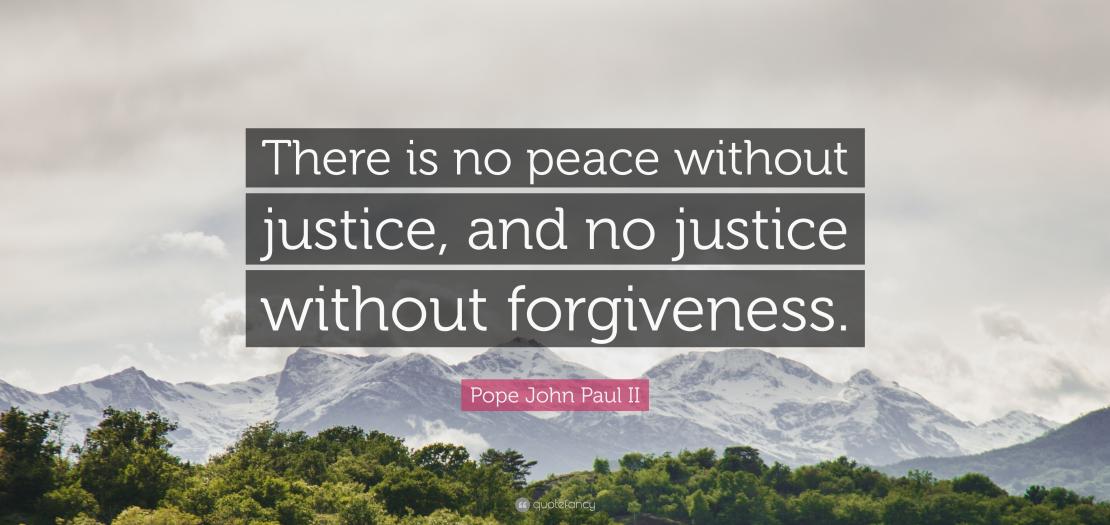Issued by the Catholic Center for Studies and Media - Jordan. Editor-in-chief Fr. Rif'at Bader - موقع أبونا abouna.org
"There is no peace without justice, no justice without forgiveness"
Whenever one turns on radio or television stations, one hears news of wars raging in various parts of the world that devastate large swathes of territories, kill and wound innumerable people, wreak havoc on all sources of life, and strip new generations of any hope for a bright future. Alongside these pieces of news, news reports also carry statements by officials calling for the attainment of peace, but to no avail as no practical steps are taken in this direction.
On April 19, 2024 His Holiness Pope Francis asked Italian children to be “artisans of peace” by praying to their peers in Ukraine and Gaza during a meeting with students and teachers of the Italian National Network of the Schools of Peace to the Vatican.
During the meeting, Pope Francis made a special appeal to remember children afflicted by wars and conflicts, especially the children of Ukraine “who have forgotten how to smile”, and for the children of Gaza, “gunned-down” and suffering from hunger.
The Pope warned that today’s challenges are truly global, affect everyone, and require “the courage and creativity of a collective dream that animates an ongoing commitment to face together the environmental, economic, political and social crises that our planet is going through.” He also highlighted the two key words at the heart of their commitment, namely “peace” and “care.”
The views expressed by Pope Francis are quite timely as they sum up the acquired goal which defines a course of social progress and prosperity, namely peace and care.
These views draw us back to January 1, 2002, namely to the message of His Holiness Pope St. John Paul II marking the celebration of the World Day of Peace, titled, "No Peace Without Justice, No Justice Without Forgiveness".
Actually, this message should be thoroughly reviewed as it serves as the cornerstone for the attainment of peace bearing in mind that peace, justice, and forgiveness are inter-connected while serving at the same time as the platform for the long-aspired global peace.
Stressing that "true peace is the fruit of justice", Pope St. John Paul II states that "forgiveness is in no way opposed to justice, as if to forgive meant to overlook the need to right the wrong done. It is rather the fullness of justice, leading to that tranquility of order which is much more than a fragile and temporary cessation of hostilities, involving as it does the deepest healing of the wounds which fester in human hearts." Consequently, justice and forgiveness are both essential to such healing.
Referring to the reality of terrorism, the Pope affirms that “a right to defend oneself against terrorism, a right which, as always, must be exercised with respect for moral and legal limits in the choice of ends and means,” then he continues: “You shall not kill in God's name” and “Those who kill by acts of terrorism actually despair of humanity, of life, of the future” and adds that “terrorism exploits not just people, it exploits God: it ends by making him an idol to be used for one's own purposes.” He then calls for following the teaching and example of Lord Jesus, Christ.
He also calls on Jewish, Christian and Islamic religious leaders to take the lead in publicly condemning terrorism and in denying terrorists any form of religious or moral legitimacy.
Reflecting on forgiveness, he says that “our minds turn naturally to certain situations of conflict which endlessly feed deep and divisive hatreds and a seemingly unstoppable sequence of personal and collective tragedies. I refer especially to what is happening in the Holy Land, that blessed place of God's encounter with man, where Jesus, the Prince of Peace, lived, died and rose from the dead.”
He concludes his message by stating that “no peace without justice, no justice without forgiveness: this is what I wish to say to those responsible for the future of the human community, entreating them to be guided in their weighty and difficult decisions by the light of man's true good, always with a view to the common good. I shall not tire of repeating this warning to those who, for one reason or another, nourish feelings of hatred, a desire for revenge or the will to destroy.”
Despite the fact that this message was issued almost 22 years ago, yet it is valid all the time particularly nowadays as it enlightens the path of policymakers and shows them that no matter problems are persistent, they can be solved with peace attained through effecting measures relevant to undertaking a new path represented in justice and forgiveness, since justice keeps violence at bay and forgiveness washes away grudge that prompts reprisal acts.
May the world leaders undertake new political paths that lead to instilling justice by reviewing this extremely important message, whereby chronic problems would be thrashed out leading to atmospheres of justice, and forgiveness.
It is time to act in accordance with this 22-year old and highly-valued message expressed by St. Pope John Paul II before it is too late, as the wars raging in various parts of the world wreak havoc on all walks of life and create an irreversible state of global instability.


